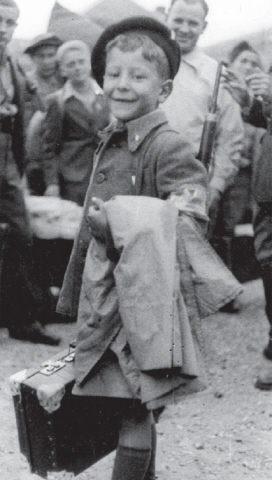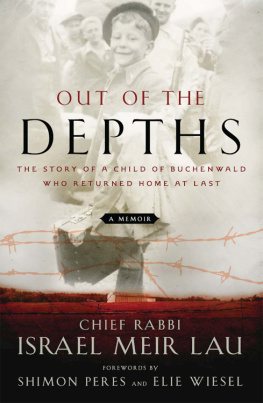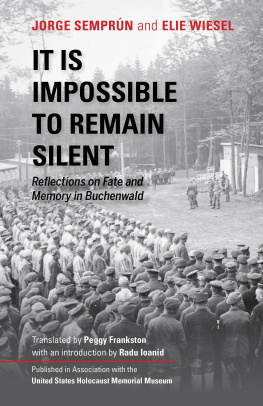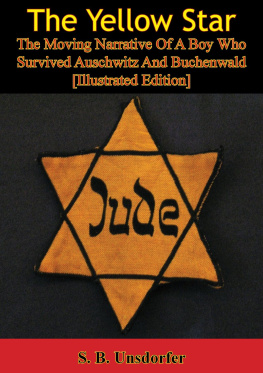
OUT OF THE
DEPTHS
THE STORY OF A CHILD OF BUCHENWALD
WHO RETURNED HOME AT LAST
CHIEF RABBI
ISRAEL MEIR LAU
Forewords by
Shimon Peres
and
Elie Wiesel
Translated from the Hebrew by Jessica Sctbon
and Shira Leibowitz Schmidt


STERLING and the distinctive Sterling logo are registered trademarks of
Sterling Publishing Co., Inc.
Copyright Yedioth Ahronoth Sifre Hemed, 2005
Copyright Jerusalem Publications, 2009
English-language edition copyright 2011 by Rabbi Israel Meir Lau
Foreword by Shimon Peres
Foreword Elie Wiesel
All rights reserved. No part of this publication may be reproduced, stored in a retrieval system,
or transmitted, in any form or by any means, electronic, mechanical, photocopying, recording, or
otherwise, without prior written permission from the publisher.
ISBN 978-1-4027-8631-0 (hardcover)
ISBN 978-1-4027-9095-9 (ebook)
Library of Congress Cataloging-in-Publication Data
In conjunction with OU Press, an imprint of the Orthodox Union, www.ou.org
Book design by Robin Arzt
Translation of Elie Wiesel foreword by Toula Ballas
All photographs courtesy of Rabbi Israel Meir Lau and Naphtali Lau-Lavie except as follows:
Front cover, background photograph of Buchenwald: Shutterstock/Sebastian Knight
Insert 1 Page 3top: United States Holocaust Memorial Museum (USHMM), courtesy of
National Archives and Records Administration, College Park; bottom: USHMM, courtesy of
Vivette Herman Samuel. Page 4center: USHMM, courtesy of Robert Waisman; bottom:
USHMM, courtesy of Central Zionist Archives. Page 5top: The Israel Museum
Insert 2 Page 1top: Associated Press. Page 5top: Menahem Kahana/AFP/Newscom;
center: AFP/Getty Images. Page 7top and center: AFP/Getty Images. Page 8top: Getty
Images; bottom; Associated Press.
A note about the translation of Bible verses: The translators made every effort to ensure that
the verses harmonize with and amplify the authors original Hebrew context, and at the same
time that they are fluent and eloquent renditions of scripture. To that end, the translators
consulted a variety of existing Bible translations, including the King James Version.
Frontispiece: With his coat and suitcase in hand, Israel Meir (Lulek) Lau, a member of the
Buchenwald childrens transport, prepares to leave the OSE childrens home in couis, France,
for the Land of Israel, 1945.
For information about custom editions, special sales, and premium and corporate purchases,
please contact Sterling Special Sales at 800-805-5489 or specialsales@sterlingpublishing.com.
2 4 6 8 10 9 7 5 3 1
www.sterlingpublishing.com
This book is dedicated to the memory of my father, Rabbi Moshe
Chaim Lau; to my mother, Rabbanit Chaya; to my brother Shmuel
Yitzchak; to my grandfather Rabbi Simcha Frankel-Teomim; to my
uncles and aunts; and to all my family who were taken away in the
whirlwind together with the six million.
Their blood cries out to us from the earth;
may the land not cover over their blood, and let there be
not space for their cries.
May the Lord avenge their blood.
CONTENTS
by Shimon Peres
Before you is a book written by the most Jewish Jew of the last decades. This is a book on Judaism, its glory and ordeals, depicting a period that could possibly be judged as the hardest, bitterest, and darkest in the annals of the Jewish people. This is a book that portrays the persona of the writer alongside the traits of his Jewish people. This is a book whose every word has been inscribed in blood.
Inspired by the stirring words of our national poet, Chaim Nachman Bialik, Should you wish to know the Source, / From which your brothers drew / Their strength of soul / Their comfort, courage, patience, trust, / And iron might to bear their hardships / And suffer without end or measure? I conclude that Out of the Depths constitutes this very source.
As we read this bookin which the writer, Rabbi Israel Meir Lau, charts the twists and turns of his life in the Diaspora and in Israelit is hard to make out the words, for our eyes have misted over, brimming with tears, as we are exposed to spine-chilling depictions, to words that hide a painful, soul-wrenching narrative. The silent words cry out to us. The probing questions remain unanswered to the bitter end.
In the words of King Solomon, I wish Rabbi Israel Meir Lau, the State of Israel, and the Jewish people length of days, and long life, and peace, shall they add to thee and all the house of Israel.
May this book serve as a pillar of fire for us all, whatever road we take.
SHIMON PERES
PRESIDENT OF THE STATE OF ISRAEL
by Elie Wiesel
A cry of despair? An act of faith? A heartrending echo of the Akedah, the eternal blight to which our people seem to have been subjected since the time of Abraham and his son?
This story, told by a child who became the chief rabbi of Israel, is all thatand much more.
Our paths crossed more than once. We were in Buchenwald together. We lived through its liberation together. We came to France together, with a group of four hundred young boys, led with unstinting devotion by the magnificent Oeuvre de Secours aux Enfants (Society for Rescuing Children). Lulek was the youngestI would say the smallest among us.
But it was he who recalled our first true encounter.
We had comehe from Tel Aviv and I from New Yorkto participate in the annual ceremony of the March of the Living for the Yom HaShoah (Holocaust Remembrance Day) at Birkenau. In introducing me to a gathering of more than ten thousand people, he recalled that particular event. In May 1945 he had just learnedfrom his brother Naphtaliof the death of their mother. And it was you, said Lulek, the future chief rabbi of Israel, who taught me to recite the Kaddish.
I had forgotten it; he had as well because he did not mention it in his autobiography.
But in this book, so rich in dramatic memories that often extend beyond the personal, he sees himself as a child. In the ghetto of Piotrkw Trybunalski. Cruel scenes in the synagogue. The selections later on. The overwhelming dread of successive separations. The scenes, each bloodier and more bruising, one after the other, all blending together.
He sees his father again, the chief rabbi of the city, humiliated and beaten by the SS because he refused to cut his beard. He remembers him telling the Jews to defend themselves by tooth and nail. He recounts his fathers final words about the martyrdom of Rabbi Akiva: his Shema Yisrael resounded to the heavens.
He evokes life with his mother in their attic hideout. The constant anguish. The daily miracles. Naphtalis escape from Auschwitz. Purim and Passover in the camp. The loss of their fathers manuscript, which the elder brother always carried with him: a study on the sanctification of the Divine Name. The appearance of Feodor, the Russian sergeant from Rostov who became his guardian angel.
Like most memoirs written by survivors, each story is full of silent tears, of invisible wounds, of unfathomable gazes, but also of that which menaces life, hope, dignity. In this accursed place, the enemy has absolute power.











